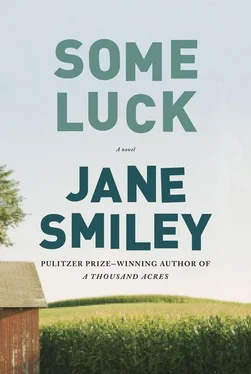
WHEN LILLIAN WROTE TO Rosanna and told her she was pregnant again, Rosanna wrote back and told her that it was because she was bottle feeding rather than nursing, which surprised Lillian a little bit. When they’d handed her the bottle in the hospital and showed her how to give little Timmy his formula, they hadn’t mentioned that. Nor did they tell her that you had to add sugar to the formula in order to make sure his BMs were the right consistency. Lillian didn’t even mention this to Rosanna, but one of the best things about rearing Timmy in an apartment rather than on a farm was that she could take care of him just the way she wished — she sterilized the eight bottles she would need for the day the night before, and left them in the enclosed sterilizer on the gas stove overnight. Then, in the morning, she measured the formula milk, added the sugar to the boiled and cooled water, mixed the water with the milk, and divided the total amount into eight equal parts, which she poured into the sterilized bottles. Just the idea of feeding a baby with the sort of water they’d had from the well on the farm, even in good times, gave Lillian the willies. And where would Rosanna have gotten evaporated, processed milk? Yes, Lillian herself had drunk milk from their cows (with the cream skimmed for butter, of course), but that she had survived was probably more a testament to luck than to anything else. And one hadn’t survived — Mary Elizabeth. Maybe Lillian had never known how she died; she certainly didn’t remember now, and she didn’t dare ask her mother. Possibly, she could ask Frank when he came again. These were the sorts of thoughts that occupied her while she was making Timmy’s formula for the day. And, of course, now there was pablum and applesauce and zwieback — he was a good eater. He no longer took a morning nap, but he went down fine in the afternoon, at exactly two, just like the book said, and at seven-thirty for the night, which meant that he was up by five, an hour before he was supposed to get up, according to the book. When she wrote and asked Rosanna about their sleeping schedules, Rosanna said, “Oh, goodness me, down up down up. The only one I remember is Claire, who slept like a rock in the front room. And you, of course. You were perfect. I don’t remember a thing before you. There was one time when I put Henry down and he was out the back door after something before I got there. I think he was almost to the barn before I caught him.”
Henry was the perfect one now, handsome, neat, a good student, destined never to make trouble. He would be fifteen this year, and already too good for Iowa State. Rosanna thought sure he would go to the University of Iowa and become a doctor.
Every morning, Lillian bundled Timmy into his snowsuit and carried him down the stairs. They had applied for another apartment, on the first floor, but so far it hadn’t been vacated. The baby carriage was inside the front door, in the hallway, and Arthur had chained it with a padlock to the banister. It embarrassed Lillian to be seen unlocking the padlock, and then it was rather difficult to get it down the two steps to the walk. The walk sloped just enough so that if she did not hold on to the handle of the baby carriage every second, it would start to roll, and she could easily imagine it gaining speed, bumping down the next two steps to the sidewalk, and rushing into the street (which was rather a busy one — how had she and Arthur not seen all of these dangers when they signed their lease?). But, according to the book, you had to go out — the baby had to have fresh air every day, even in the rain or snow, which was why the baby carriage had a hood. Once she was out, mostly she walked around the streets, or over to the Giant supermarket, where she looked at the rows of baby food and tried to decide which to try next. One particularly discomfiting thing that Rosanna told her was that she herself, Lillian, had loved liver as a baby, calves’ liver that Rosanna rolled in seasoned flour and fried in butter until it was just done through. “No one else liked it, but you couldn’t get enough.” Lillian would never feed Timmy such a thing.
Lunch was baby chicken with peas, or baby turkey with carrots, and a little tapioca for dessert, and then the story and the nap. Usually, Lillian went down, too, but she kept the doors open so she could see the crib, and she taught herself to sleep facing it. Timmy’s door was right by the bathroom door, and though he couldn’t get out of his crib, and the bathroom door was closed, and the toilet lid was down, what would keep him, really, from waking up, heading for the bathroom, and plunging headfirst into the toilet?
Arthur didn’t have these sorts of fears. Arthur had gotten a new job, or, rather, the same job at a new office, and what the name of that office was had gone in her one ear and out the other. Some initials. The best thing about Arthur was that he still ran up the stairs at six and threw open the door, and gave her a great hug, but then he immediately took Timmy in his arms and danced him around, saying, “Who is this kid? Is he that same kid who was here last night? Don’t believe it!” Arthur was a tickler and a tosser, and Timmy seemed to love both being laid on his back on the couch and tickled until he was burbling with laughter, and being tossed up and caught like a sack of flour. And he was like a sack of flour, which was a delicate thing. With Arthur tossing, no sack of flour would ever tear and spill, and no baby would ever get hurt.
After Timmy was born, Lillian had caught Arthur crying, and not just one time. Finally, he took her hand and said, “I didn’t realize how worried I was, or how dumbfounded I would be. I thought when Laura was born dead that I had just accepted it, but I guess I hadn’t.” Lillian tried not to think that she loved Arthur for his misfortune, but it did seem to add a deeper color to her love, and it made him a very attentive father. She knew other women with babies now, and their husbands seemed a little put off or frightened by their children, but Arthur was eager for more — Irish twins! He’d had friends in school who were Irish twins — born within a year of one another, so close together that they got put in the same grade. These two were tremendous friends, and now that they were grown up and home from the war, they were in the car business together in Roanoke.
Timmy was active. What was he, exactly eight months today. Lillian had taped folded washcloths over the corners of the coffee table with masking tape, which wasn’t supposed to leave marks, and Timmy was just sitting there, pulling himself to his feet and letting himself sit, and pulling himself up, and laughing. She wanted him to go down for his nap, but he was so excited that she didn’t think he would do it. It made her a little anxious, but she decided to get out her Brownie camera and take some pictures to send to Rosanna. That was another thing — there was only one picture from their childhoods, one taken by Mrs. Frederick (poor thing) when Lillian was nine and Henry was three. None of Frank or Joe or even Claire, only one of Walter and Rosanna, on the day they were married. Lillian was deep into her first scrapbook already, with pages of pictures of Timmy, and more than a few of herself and Arthur taken here and there around town (though Arthur didn’t like to be photographed, and in most of his, his hat was pulled down). He looked very sharp.
Lillian snapped six or eight pictures, making sure to get the sun behind her, and then set down the camera and picked up Timmy and kissed him all over. How another child was going to fit into their world, she could not imagine.
MAMA TOOK CLAIRE to the optometrist in Usherton because she had failed a test. It wasn’t a regular test, it was one where the kids had to go into the lunchroom, with all the shades down, and read from a lit-up square on the lunchroom wall, which was normally painted pale blue. There were letters in the square, big to small, and also things sitting up and lying down, and you had to say which direction they were pointing. It didn’t take very long. Claire could read the two biggest lines of letters, but nothing below that without leaning forward and squinting. Mama was annoyed, because no one had ever needed glasses before in their family. “As far as we know,” said Papa.
Читать дальше













